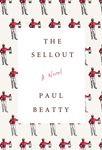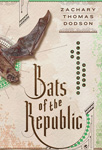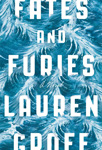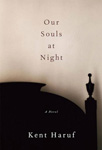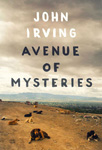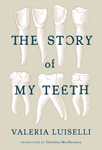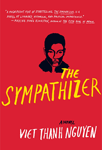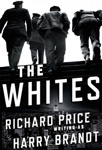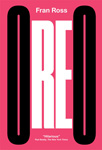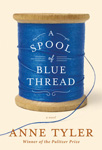by Chris Adrian and Eli Horowitz
Buy it at Powell’s »Celeste Ng: Let me be upfront with you: The Sellout is flat-out ridiculous.
This is a book in which the narrator’s father uses him as a psychological guinea pig—placing “toy police cars, cold cans of Pabst Blue Ribbon, Richard Nixon campaign buttons, and a copy of The Economist in [his] bassinet” and teaching him to fear the “presented stimuli” by firing a gun “while shouting “Nigger, go back to Africa!” loud enough to make himself heard over the quadraphonic console stereo blasting ‘Sweet Home Alabama.’”
It’s a book in which a black man named Hominy Jenkins, the last surviving Little Rascal, insists on becoming the narrator’s slave. He won’t do any work—other than posing as a life-size lawn jockey—but insists on being whipped, so the narrator takes him to “Sticks and Stones, the BDSM club on the Westside.” It’s a book in which a black intellectual named Foy Cheshire rewrites classics as The Great Blacksby and The Pejorative-Free Adventures and Intellectual and Spiritual Journeys of African-American Jim and His Young Protégé, White Brother Huckleberry Finn, as They Go in Search of the Lost Black Family Unit.
Did I mention that the main character is a farmer (of gourmet produce and artisanal weed) and gets around town on a horse?
But reading The Sellout through a realist lens—or really, with plot as the main goal—is missing the point. And, frankly, it’s missing the fun. Because The Sellout is funny. It’s bitingly, scathingly, relentlessly funny, gleefully spraying satire everywhere. No one is spared. In fact, it delivers its hardest punches in its most gloriously absurd passages. Early in the book, the narrator visits a zoo and sees a woman unthinkingly describe a gorilla named Baraka as “presidential.” When she sees him, she begins “crying and apologizing for having spoken her mind and my having been born. ‘Some of my best friends are monkeys,’ she said accidentally.”
Beatty’s daring us to laugh, and I felt guilty, but I did. A lot. The preposterousness of the plot is actually what makes The Sellout work: It zooms past the typical (and stereotypical) discussions of race in the United States. “Of course it’s all ridiculous and problematic,” the novel seems to be saying. “The whole system is ridiculous and problematic. What did you expect?” Like the best satire, The Sellout makes you aware of how uneven and shifting the ground is, and to question anything that seems too stable.
At first glance, Fates and Furies couldn’t seem more different than The Sellout. But as I reread Groff’s novel, which I’d read in ARC, I saw surprising similarities. Both books have the same effect of shaking the ground under the reader’s feet. The Sellout does it through satire: When everyone’s a target, no one has the moral high ground. Fates and Furies uses plot twists: In the second half of the novel Groff neatly unravels the first half, showing us that nothing is as we’d perceived.
Lotto, the husband, is of course not the blessed, golden genius everyone believes he is—there’s quite a bit less to him than it appears, and quite a bit more to Mathilde, his (apparently) infinitely patient, supportive spouse. Even Lotto realizes this, if dimly: “… he saw Mathilde all of a sudden,” says an early passage. “The dark whip at the center of her. How, so gently, she flicked it and kept him spinning.” This, it turns out, is a huge understatement.
It’s hard to say more without giving the plot away—and that’s both the draw and the weakness of Fates and Furies. Like Gone Girl, to which it’s often compared, the twist is such a major part of the book that just knowing it’s coming (which the jacket copy reveals) changes the reading experience. Watching the pieces click into place is deeply satisfying: Groff is a masterful writer, and here she builds up a tall tower brick by brick and then magically reassembles it before your eyes—upside down.
But the heavy reliance on the twist also makes it feel a bit like a gimmick. Things are so perfect for Lotto and Mathilde that we expect this narrative to be undercut. Presented with two people who are extraordinarily successful, beautiful, happy, and tall (as we’re told several times), how can we not root for them to be cut down to size, to hope there’s more here than meets the eye?
And the particular secrets in this marriage are so huge that paradoxically, they end up narrowing the book’s scope. Fates and Furies has been praised as a novel about capital-M Marriage: In the Washington Post, Ron Charles wrote that it “will shake your confidence in what you think you know about your spouse—and yourself.” But Mathilde is so far from a typical person, and the secrets she keeps are so dramatic and so deliberately concealed, that it’s hard to extrapolate onto an ordinary marriage. Yes, spouses keep secrets—but the scale here is outsized, which makes it harder to draw parallels between the novel and the real world.
Again, I’m holding back spoilers, and that’s part of my point. For me, the joy was in the slow revelation of those dramatic secrets and watching this story turn inside out, and while I finished the novel with deep admiration for Groff’s plotting abilities, I didn’t leave with lasting feelings about the characters.
What’s most alive in Fates and Furies—what drives the book—is the ideas animating the characters, often more so than the characters themselves. They seldom read as fully fledged people. Their names alone resist that: Lotto (short for Lancelot), Gawain, Mathilde, Antoinette, Chollie. Lotto refers to his mother as “Muvva.” There’s a dog named God. And that’s even before we get to the plot, which involves—in no particular order, again to avoid spoilers—stagecraft both literal and figurative, identity change, sex slavery, long-lost children, murder, and revenge carefully enacted over decades. All of which really do happen, sure—but which, all mixed together, push the book into the realm of metaphor.
The same, of course, can be said of The Sellout. Hominy Jenkins, Foy Cheshire, and Marpessa Delissa Dawson are hardly realistic names, and the narrator is never given a first name at all. And the events of The Sellout—the literal erasure of a town, resegregation, a shootout—are, if anything, even more (melo)dramatic than those in Fates and Furies. Which brings me to the main similarity I saw between these two novels: Both are operating on the same fundamental level—essentially, as parables.
But it works better in one case than in the other. While I was completing this writeup, Supreme Court Justice Clarence Thomas broke his 10-year silence from the bench to ask why domestic abusers shouldn’t be allowed guns. Immediately, I thought of the opening of The Sellout, where Thomas—there named only as “the black Justice,” and facing a black man who’s trying to bring back segregation and slavery—asks his first-ever question from the bench: “Nigger, are you crazy?”
And that’s the thing: In Fates and Furies, the exaggerations seem a bit too fantastic for the realistic world in which the novel takes place. In The Sellout, the fantastic exaggerations seem all too plausible.
Match Commentary
By Katy Waldman, Dan Kois & Laura Miller
Katy: Hi Dan and Laura. With these words, I hereby convene the Slate Audio Book Club to argue about Celeste Ng’s Tournament of Books verdict. Ng elevated The Sellout, by Paul Beatty, to the finals, and sent Zombie contender Fates and Furies back to the cemetery. Were you surprised? Delighted? Upset?
Laura: I was not surprised, especially given that Beatty won the National Book Critics Circle Award for fiction.
The Sellout has been a favorite in the ToB and a word-of-mouth hit among my friends. I definitely prefer it to Fates and Furies, so I have no beef with Ng’s ruling, but it might surprise some readers. Fates and Furies was a bestseller, especially for a literary novel, and even President Obama pronounced it his favorite book of the year. It has a higher profile outside of writers’ circles.
Dan: Ng’s decision did not surprise me either. One of the fun parts of the Tournament of Books is watching literary bestsellers get knocked from their thrones by little-books-that-could, and the weird and (until the NBCCs) unheralded The Sellout certainly qualifies.
I would like to ask you both a question though.
Ng’s decision convinced me that she liked The Sellout better than Fates and Furies. But it also convinced me that it’s basically impossible to talk about Fates and Furies with any seriousness without spoiling the hell out of it.
One of Ng’s points is that the book’s dependence on twists is one of the things that makes it feel less resonant, overall, than The Sellout, whose plot is so self-evidently absurd that it serves purely as a scaffold for Beatty’s language and gags.
When I first read Fates and Furies I was really pretty unhappy about it. Laura, you wrote a piece that I edited in Slate that dug into the plot of Fates and Furies, with major spoilage, which through good criticism and analysis gave me a better sense of what Groff had accomplished in the book, even if it didn’t make me like it more.
Is a book so dependent on plot that you can’t talk about what makes it unique or interesting without fear of spoilers inherently a less satisfying book than one whose plot matters less?
And: Do you wish, as critics, that you could just spoil plot willy-nilly in any review without worrying about the surprises you might give away?
Laura: I’m not sure I agree that Fates and Furies is spoiled if you learn that it’s about—to put it simply—two views of a marriage, first the conventional one, held by the husband, then the rather gothic one held by the wife.
I don’t think most of the people who read the novel would have picked it up or stuck with it if they thought Lotto’s view of the world and his marriage was sufficient, or at least all they were going to get.
Katy: Maybe it’s worth drawing a distinction here between plot and structure. I think the bifurcated structure of Fates and Furies is central to its philosophical argument (to the extent it has one); the plot seems more disposable.
Laura: The question is a little muddled by the massive cultural echo of Gillian Flynn’s Gone Girl. That novel is very dependent on the sudden reveal of an alternate perspective on what’s going on. I don’t think that’s the case with Fates and Furies, but obsessive spoilerphobes might mistakenly assume that it is. But Gone Girl is brilliant, a better novel than Fates and Furies, so I don’t think that a reliance on a twist necessarily invalidates a novel’s literary value.
One thing I like about the pairing of these two books, though, is that it does highlight the degree to which I think Fates and Furies has been enjoyed by readers as a kind of satire. It’s got a privilege-assuming, rather spoiled golden boy of a husband who is completely oblivious to the reality of his wife’s life.
Given that most readers of literary fiction are middle-class women, I’d bet a lot that this is a reason for its success.
Dan: Ha, that’s funny. The idea being that while no actual literary-fiction-reading woman is a bloodthirsty revenge-seeker like Mathilde, they all can relate to having a husband who just doesn’t get it? I love that, if true. As the husband in this scenario, I didn’t get it.
Laura: When I hear people praise it, they often cite that aspect of the premise with enthusiasm.
Katy: Wow, I would not have ascribed the book’s appeal to the “relatability” of its characters. Groff seems to hold her couple at such a distance, at least emotionally. They felt to me like one-dimensional playthings for the Greek powers in the title.
Laura: The Sellout, though, is more savage and Swiftian. It belongs to a grand tradition of satire written by African-American men. Invisible Man is an obvious precedent, but it also reminded me of Trey Ellis’s very funny Platitudes, written at the height of the late-’80s identity politics wars.
Dan: Ooh! I have the Vintage Contemporaries of Platitudes but have never read it. Dig the sweet cover though:
“HEY, DON’T SWEAT IT, EARLE.”
Laura: Good ol’ Vintage Contemporaries! That cover art.
Dan: And Katy, yes. Those Greek powers in the title being, of course, The Author herself.
Laura: I think readers relate more to the premise of Fates and Furies—that there is a dark, difficult truth under the sunny ease of the husband’s cruise through life—than to Mathilde. Satire does kind of depend on a shared disillusionment more than identification.
Dan: Does The Sellout depend on shared disillusionment more than identification? That is, is it satire exactly, or more of a burlesque?
Laura: I think it does. It’s grotesque for sure, but built into that premise is the feeling that the narrator has been shoehorned into a racial identity that feels absurd and unnatural to him because the racial caste system that produced it is absurd and unnatural.
Katy: Yes, satire in the mode of Catch-22. Giddy nihilism rising out of disenchantment. Not to bring everything back to Trump, but do you think it means anything that such a gleefully antisocial book is resonating with so many people right now?
Laura: But it’s so reminiscent of Invisible Man, the way the narrator is just trying to make a life for himself and everyone else keeps trying to impose alien identities on him. It’s not just that he lives in a racist society that discounts him. His father performed cruel experiments on him, Hominy forces him to be his “master,” etc. There’s no space in which anyone allows him to decide for himself who he is, and at the same time he values the community he comes from. I think a lot of these quandaries are longstanding.
Also, I have to add that The Sellout is a great Los Angeles County novel. Beatty really captures the weird cultural and political climate of that place.
How important is it to you that the behavior of characters, or what happens to them, is believable? I know, Dan, that you found some of Fates and Furies to be preposterous.
Dan: Preposteriffic!
Katy: I do not care about that at all. Tell me why I’m wrong.
Laura: I must admit that The Sellout is so relentless that it easily tired me. I often found it funny, but it worked best in small sections of reading. But it signals that it’s going to be absurd from the very start. Whereas I think Groff at first seems to be writing straightforward realism before she changes register.
Dan: I think this gets to the heart of the question I was asking before. A novel like Fates and Furies demands that its characters behave in recognizable fashion because it attempts to exist in a recognizable world. It’s very dogged about that! Its New York is meant to be our New York; its world of off-Broadway plays and arts residencies is meant to be recognizable to those readers who live in that world (or who have dreamed of living in that world).
Katy: I am not sure I agree! I think from the beginning the kind of alien, otherworldly tone of the narration tells us we are not in a realistic world. Plus all the citations: It’s all very “created” and fabular. And I got the sense that the central relationship was less a partnership between recognizable people than an intellectual proposition: luck versus will, male versus female, sunlight versus shadow. We are meant to think about Lotto and Mathilde, but not feel about them. (FWIW, one of my issues with Fates and Furies was that for all its cerebral provocations it seemed really emotionally remote.)
Laura: You two read this book so differently.
Dan: Maybe I was just angry because I am Lotto. Lotto, c’est moi.
Katy: Better than Chollie.
Laura: Does your wife “edit” all your work, Dan?
Dan: She just wants me to succeed!
Katy: OK, I have a theory about the Groff. I think it is exactly the type of book that would be nominated in a Tournament of Books and then axed in the opening round, and then revived in a Zombie Round, and then axed again.
Dan: Go on.
Laura: Sounds more like a theory about the ToB. I imagine that the typical ToB follower thinks of Fates as the sort of book their mom likes, whereas The Sellout has the word “titties” in it. A lot.
Katy: We discussed it a bit on our podcast. There’s an ineffable and potent quality to the book that you feel intensely while you are reading it, but it’s hard to express in words. And then, once you put it down and reflect, you wonder why the heck you felt so swept up.
Maybe it is the inventiveness of her writing, or her archetypal themes (vengeance, fate, luck). But it works better when you’re in it, and then it dims on you.
Laura: I give full props to anyone who can make a person want to keep on reading their book, in this day and age. And I agree: It has a sense of momentum or purpose, but once you reflect on it, that sort of evaporates.
Katy: Dan is NOPEing, I can feel it.
Dan: NOPE.
We really DID have different responses Katy! I was made so angry while I was in it and then only after Laura Miller explained it to me did I grudgingly accept its artistry.
Katy: Dan, we should marry our alarmingly opposed perspectives on the same story in a single mesmeric volume.
Laura: I would read.
Kevin: [sound of door creaking open; chairs shuffling; awkward coffee-sipping] Once again, thank you so much, Laura, Katy, and Dan. I love that your discussion (which is what, the second, third, fourth one we have had on these novels?) seemed to be as much about wrestling with these books as it was about reaching a consensus on them. And the discussion continues, not just in the comments below, but also tomorrow when The Sellout takes on The Turner House for the right to take home a live rooster. As we prepare for the finals, we also want to thank Arian Saleh of The Libretto Project, who has composed musical themes specially for this year’s ToB, for both The Sellout (“Me v. The United States of America”) and The Turner House (“Cha-Cha’s Haint”). The ToB championship has a soundtrack, and it is pretty cool.
As always, we invite any and all to put their predictions for tomorrow’s final in the comments below. Include the name of the winning book and the final tally (for example, “The Turner House 10, The Sellout 9” or “The Sellout 10-9”; the total number of judges will be 19). We will pick a winner (at midnight Eastern) from the correct guesses and send that person a sweet care package from Field Notes. John and I will also throw in signed copies of our own novels, as well as some other fun surprises.
Speaking of Field Notes, only a limited number of special edition Rooster 2016 Field Notes Memo Books remain. For every one ordered for just $2, Field Notes will send $4 to 826 National to help kids launch awesome literary endeavors.
Also, for New York area Rooster Boosters there will be a post-tournament meetup tomorrow. Nozlee will be there along with tons of ridiculously fun and interesting people.
See you back here tomorrow, everybody!

The official 2016 Tournament of Books T-Shirt by book designer Janet Hansen. Order yours!




